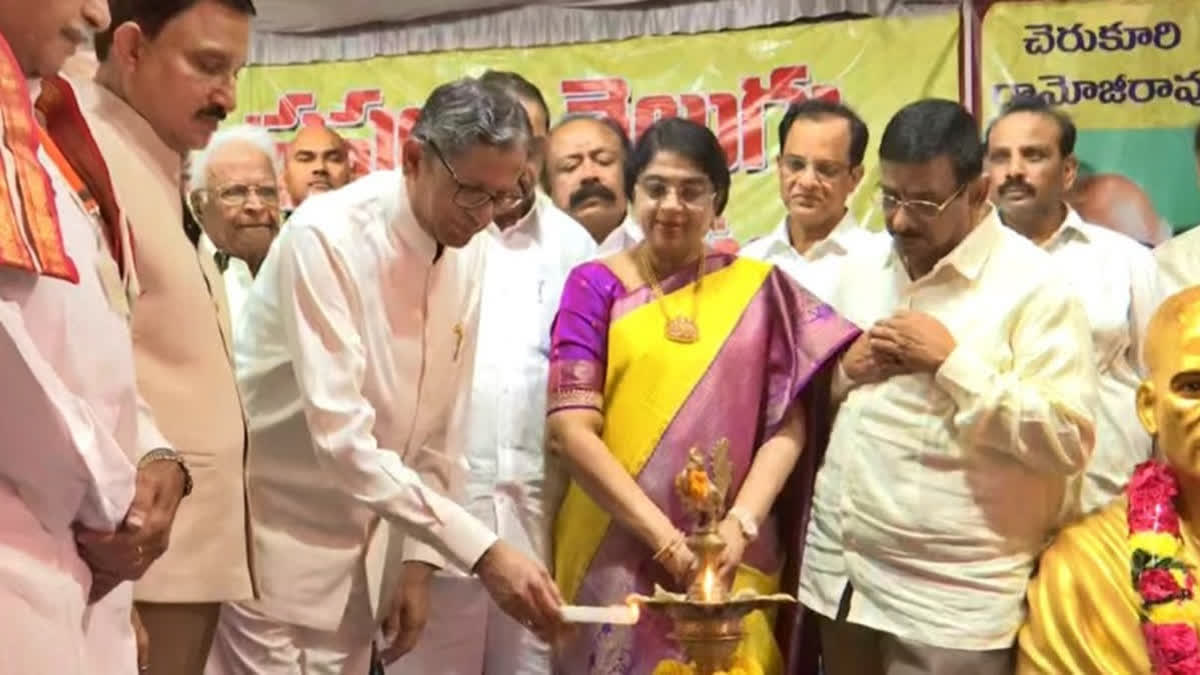Amaravati: Non-State Telugus have raised concerns over the decline population of Telugu people settled in Tamil Nadu, Karnataka, Maharashtra, Odisha and other states.
They pointed out discrepancies in the census data and questioned how only 5.6% of people in each district of Tamil Nadu are listed as Telugu, when the actual percentage is estimated to be around 30%. They lamented the deteriorating situation in areas where Telugu was once a prominent language.
In response, representatives from the State Non-Andhra Federation have announced plans to work with Telugu associations in various states to create a unified syllabus for teaching Telugu to future generations and organize online classes. The discussions took place during the 6th World Telugu Writers' Congress, where a special session, chaired by Rallepalli Sundara Rai, President of State Non-Andhra Union, was held for Telugu representatives from other states.
Gradual disappearance of Telugu identity- R Sundarao, Kharagpur
Telugu people, settled in other states for centuries, are gradually losing their identity. Sundarao noted that several Telugu names are being altered over time, such as Sundararao becoming Sundararaman and Radhakrishna becoming Radhakrishnan. R Sundarrao said historically, Telugu people in West Bengal exclusively studied in Telugu medium until around 30 years ago. Many schools were founded and managed by Telugu families, But with the rising preference for English education, children are now largely excluded from Telugu-medium schools. As a result, several Telugu schools have shut down. However, Telugu continues to be taught as a subject up to class XII, though the overall situation remains concerning.
Challenges Faced by Telugu People in Tamil Nadu - Sitaramaiah, Krishnappa, Hosur
In Tamil Nadu, where a significant Telugu-speaking population resides, activists are going door-to-door to advocate for the preservation of Telugu language. They reported that the state government is undermining minority languages, particularly by imposing Tamil as a compulsory subject. While there has been a lack of Telugu textbooks and while Telugu remains part of the syllabus, there is no formal marking for the subject. Teachers are reportedly demotivating Telugu students and schools have been informally instructed not to order Telugu books, further exacerbating the situation.
Telugu Culture in Gujarat - PVPC Prasad, Ahmedabad
In Gujarat, PVPC Prasad noted that urbanization has caused the Telugu community to scatter, but despite the challenges, the community continues to organize celebrations and festivals to honor Telugu vaggeyakars, preserving their cultural heritage.
Educational Challenges in Odisha - Sonthi Nageswara Srinivas, Bhubaneswar
In Odisha, Sonthi Nageswara Srinivas highlighted that many Telugu schools suffer from a shortage of qualified teachers. The state government has not appointed new teachers and although students are given Telugu textbooks, the lack of teaching staff hampers the educational experience for Telugu-speaking children.
Population Misrepresentation in Karnataka - Rajulapalli Pratap, Bengaluru
Rajulapalli Pratap pointed out that Bengaluru alone is home to 19% of the Telugu-speaking population, but the census misrepresents this, claiming only 30 lakh Telugus reside in the entire state of Karnataka. This miscalculation has led to a lack of accurate recognition and support for the Telugu community.
Call for Action from Andhra and Telangana Governments - Satyanarayanamurthy, Brahmapura, Odisha
There is a growing demand for the Andhra and Telangana governments to take responsibility for the issues faced by Telugu-speaking communities in other states. Satyanarayanamurthy stressed the need for a thorough study of the challenges facing these communities and called for proactive measures to support and preserve the Telugu language.
Dr GV Poornachandu, General Secretary of the World Telugu Writers' Conference had urged state governments to support these communities with innovative tools like AI to preserve and promote Telugu worldwide. “Despite challenges, Telugus outside Andhra Pradesh and Telangana have displayed remarkable affection for their language. State governments must take proactive measures, implementing modern tools like AI to preserve the Telugu language globally,” he had said at the conference.



